NDVI stands for "Normalized Difference Vegetation Index". NRG stands for "Near-infrared / Red / Green". NDVI and NRG are both ways to visualize the amounts of infrared and other wavelengths of light reflected from vegetation. Because both these methods compare ratios of blue and red light absorbed versus green and IR light reflected, they can be used to evaluate the health of vegetation. It's a snapshot of how much photosynthesis is happening. This is helpful in assessing vegetative health or stress. (Read more here: https://www.agronomy.org/publications/jeq/articles/36/3/832) ## Do-It-Yourself These techniques for vegetation analysis were developed for satellite imagery, but at Public Lab, we've been working a lot on capturing infrared imagery using our DIY [near-infrared camera](/wiki/near-infrared-camera) setup, and combining it with visible bands to produce NDVI images such as the one above. ## What these images mean What exactly are these images we're trying to make? What do they tell us about vegetation, and why? These diagrams should help to understand what it is we're doing and why these are good ways to analyze plant life. ## The NDVI equation [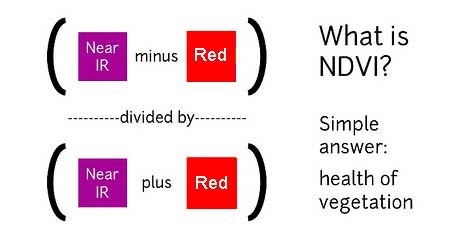](/i/44723) **NDVI = (Near Infrared - Red)/(Near Infrared + Red)** NDVI is a ratio which tries to emphasize photosynthesis while filtering out sun glare. The above equation is run for every pixel, using source data from an infrared photo and a visible light photo, like this pair: [](https://publiclab.org/system/images/photos/000/021/771/original/5390895115_c9d4d38fec_o.jpg) The result can be false-colored to make the high-photosynthesis areas more clear, and used to examine where plants are and how healthy they are. [](https://publiclab.org/system/images/photos/000/021/770/original/PetVISNDVIcomp.png) _Figure above: Normal color photo (right) and normalized difference vegetation index (NDVI) image (left). NDVI image was derived from two color channels in a single photo taken with a camera modified with a special infrared filter. Note that tree trunks, brown grass, and rocks have very low NDVI values because they are not photosynthetic. Healthy plants typically have NDVI values between 0.1 and 0.9. -- @cfastie_ ### Activities Here are a range of activities you can do to produce and interpret your own NDVI imagery, whether downloaded from a satellite imagery provider or [collected yourself using a DIY technique](/wiki/multispectral-imaging) [activities:ndvi] ****   Most DIY converted cameras today (those from Public Lab) use RGN instead of NRG, so the blue channel represents infrared instead of the red channel. That looks like this: [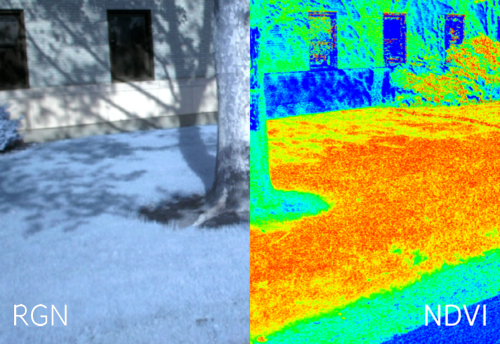](/i/45468?s=o) **** ## NRG imagery Some people are also interested in producing NRG imagery (like the below image), where `Near-Infrared, Red, and Green` are used to compose a picture instead of the usual `Red, Green, and Blue`. [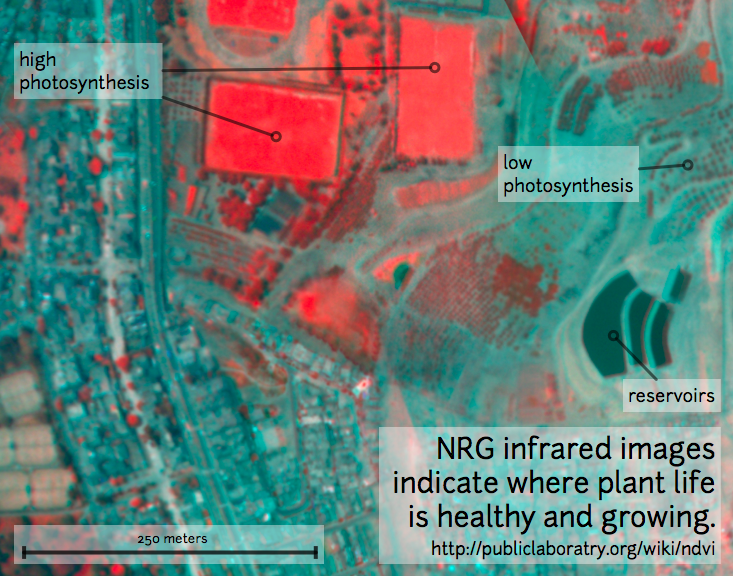](/i/25064) This diagram explains the swapping, which allows us to 'see' infrared as if it were a normal color: [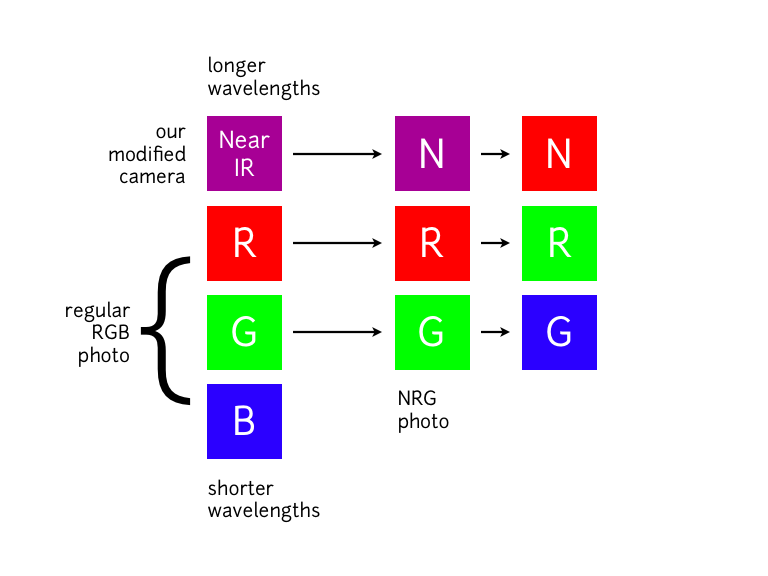](/i/25063) **In NRG images, the deeper and clearer the red color, the denser and healthier the vegetation (more or less).** ### Questions [questions:ndvi] ### Other examples of DIY NDVI imaging From around the internet: Begin watching at 2 minutes to see the resulting imagery: *This topic is part of the [Grassroots Mapping Curriculum](/wiki/mapping-curriculum) series.* **** [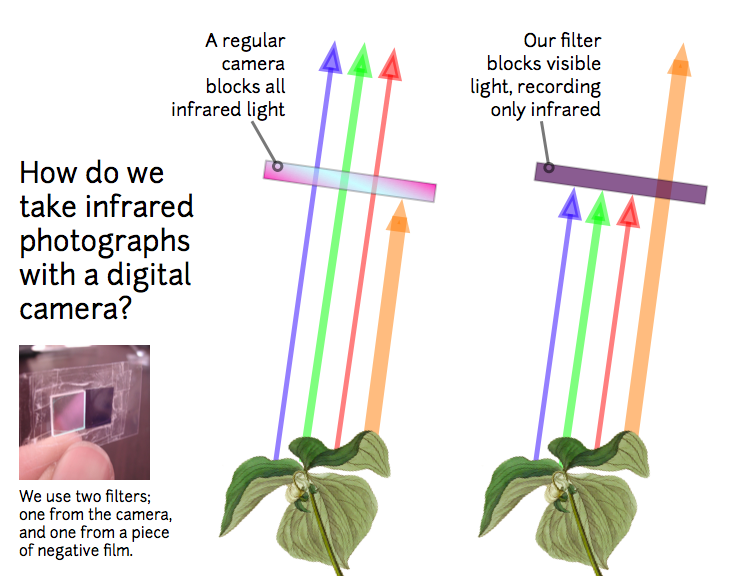](/i/25066) [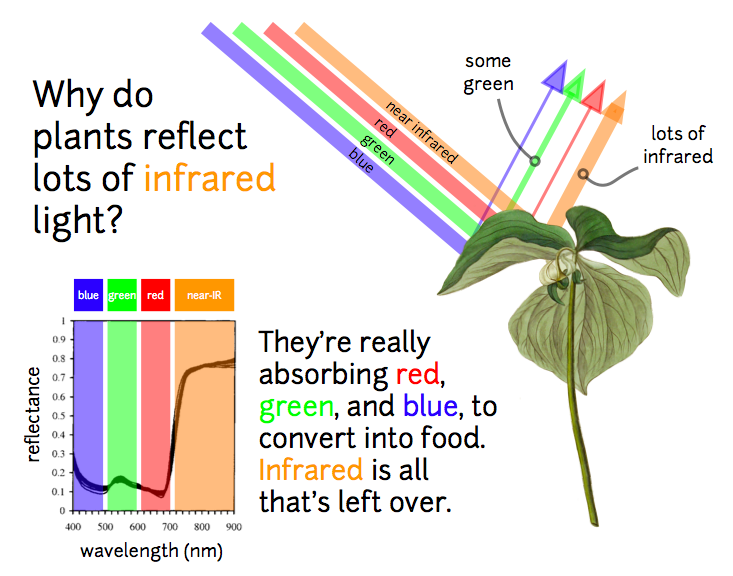](/i/25065) ...
| Author | Comment | Last activity | Moderation | ||
|---|---|---|---|---|---|
| plnedestroyer | "im talking about the histogram for the infrablue, so I can make a histogram from an image " | Read more » | about 7 years ago | |||
| cfastie | "The only files used here are the photos themselves. You can right click and "open in new tab" and then "save image as" to get these images. " | Read more » | about 7 years ago | |||
| plnedestroyer | "where might I find files for this, I am needing it to create data for a science project, I would also like to keep in contact via email or other me..." | Read more » | about 7 years ago | |||
| warren | "I think they're 4 inches, not 5 -- sorry for the slow response! " | Read more » | about 7 years ago | |||
| warren | "Hi, very late reply but I'm starting to tie everything in this topic area together -- there's now documentation up at both https://publiclab.org/wi..." | Read more » | about 7 years ago | |||
| warren | "Note: we now have a guide to setting white balance, although this question still stands for what the settings should actually be. https://publicla..." | Read more » | about 7 years ago | |||
| warren | "Hi, Chris - we're (finally) hoping to address this in a few different ways, and thanks for your excellent and thoughtful suggestions. I've been bre..." | Read more » | about 7 years ago | |||
| cfastie | "The new filter can be inside the camera or in front of the lens. If it is in front, it will get scratched and might be bent (not flat), but it is e..." | Read more » | about 7 years ago | |||
| rrstrauss | "@azaelb There's something I don't really get. Basically what we need to do is to remove the ir cutter from inside the camara and place the red filt..." | Read more » | about 7 years ago | |||
| robotfarms | "Thanks, I just ordered a pack. " | Read more » | about 7 years ago | |||
| williampasco | "Creo que del tamaño de un smartphone de 5 pulgadas, está buena esa máquina envía noticias de eso estoy interesado mucho en el control de hierbas. P..." | Read more » | about 7 years ago | |||
| iolanthe82 | "@iolanthe82 awards a barnstar to abdul for their awesome contribution! " | Read more » | over 7 years ago | |||
| warren | "Just linking this up with @nedhorning who has done a lot since!! " | Read more » | over 7 years ago | |||
| BettyeGagner | "The differential reflection in the red and infrared (IR) bands enables you to monitor density and intensity of green vegetation growth using the sp..." | Read more » | over 7 years ago | |||
| Kalarav | "Dear @cfastie, Thank you very much for your response. I'm Using OVF5642 Camera (http://www.arducam.com/camera-modules/5mp-ov5642/). Midopt 475/550/..." | Read more » | over 7 years ago | |||
| cfastie | "The original photo above has some potential for conversion to NDVI, but the red channel (NIR) is not very much brighter than the blue channel (blue..." | Read more » | over 7 years ago | |||
| Kalarav | "Dear @cfastie, Thank you for your kind response. Actually, I'm not getting the meaning of Color key. I'm an apology for that. It's kind of NDVI BAR..." | Read more » | over 7 years ago | |||
| cfastie | "Sorry I was wrong about your original photo being grayscale. You are correct that it is color photo. All three color channels are extremely similar..." | Read more » | over 7 years ago | |||
| Kalarav | "@cfastie: Thank you for your kind suggestion. In the early stage, we have concluded that two camera solution needs more synchronization of alignmen..." | Read more » | over 7 years ago | |||
| ashishkochaar | "It is really very awesome. I am also trying to take the selfies like this but when I was at Chase Routing Number Texas then I had taken a lot of se..." | Read more » | over 7 years ago | |||
| cfastie | "Your image "660_850_Orginal.jpg" is a grayscale photo. The photo taken with your camera should be a three color photo with different values in the ..." | Read more » | over 7 years ago | |||
| Kalarav | "I have some doubts regarding NIR Image. we are using MIDOPT 660_850(RED_NIR only) lens to capture image( attachment: 660_850_Original.jpg). Using 6..." | Read more » | over 7 years ago | |||
| Kalarav | "@jarrarte, Thank you for your support in image alignment in process and it is completed 75%. " | Read more » | over 7 years ago | |||
| jarrarte | "@Kalarav, yes, I think it's possible to align the images, even when one is RGB and the other one is NIR. Actually, the examples in the blog post di..." | Read more » | over 7 years ago |